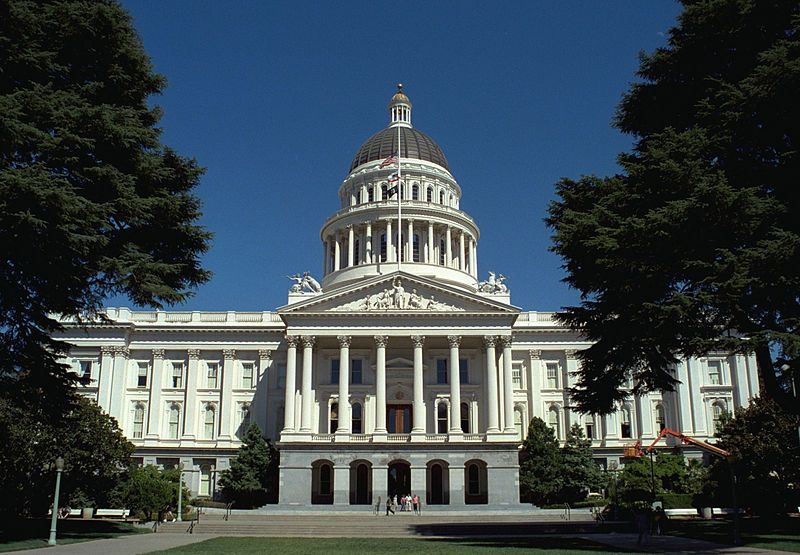“Balance” Is Missing From Budget
By KATY GRIMES
SACRAMENTO — As the Budget Conference Committee hearings began on Wednesday, Republicans challenged the frequent use of the word “balanced” for describing the tax increases and budget cuts within the governor’s budget proposal. With Republicans and Democrats coming at the budget from different ideological positions, several large state issues remain unresolved.
The conference committee is charged with the responsibility of bridging the differences. This report is based on my attendance at the hearings.
Gov. Jerry Brown needs a few Republicans to vote in favor of placing the tax increase extensions on a June ballot. So far, with a $25 billion state budget deficit, there are bigger challenges facing the committee than just a difference of ideology, with Republicans standing firm in their opposition to the tax increases.
Before the hearing, Sen. Mark Leno, a San Francisco Democrat, said the state’s budget problems are not “simple addition or subtraction.” But at the hearing, Leno blamed California’s convoluted budget process on the crippled economy, resulting in the state whittling down the $125 billion budget to $84 billion.
Leno said that the Legislature must “take action” on the budget by the first week of March in order to get Brown’s five-year tax increase extensions on a June ballot.
The governor released his budget in January. He relied on budget cuts and shifts, tax increases and — most controversially — a constitutional amendment needing voter approval to extend for five years expiring tax increases passed by the Legislature in 2009.
“Sacramento politicians would prefer to put the blame on already overburdened taxpayers for not providing enough money to the state; if they won’t come up with more money they are being “unreasonable and selfish,” said Jon Coupal, President of the Howard Jarvis Taxpayers Association.
“Legislators have been stressing that taxpayers should share in the sacrifice, and they say this with a straight face,” said Coupal. “But taxpayers have been sacrificing for years. While already imposing some of the highest taxes in the nation, the Legislature, approved massive new taxes just two years ago. Two years later, the economy and resulting state revenues have continued to decline, and the house remains in chaos. The new governor’s response: Even more taxes.”
The budget conference committee is faced with making decisions about the proposed public safety realignment, the elimination of redevelopment agencies, child care programs, in-home support services and long-term health care programs, and must do so according to Democratic legislators’ fast-track timeline.
Legislative Analyst Mac Taylor and Department of Finance Deputy Director Michael Cohen both offered legislators overviews of the budget. “Both houses maintained the governor’s balanced approach” with the budgets, with “equal cuts and revenues,” Cohen said.
But Senator Bob Huff, R-Diamond Bar, disagreed with Cohen’s “balanced approach” description, and asked Cohen if there really were equal cuts and revenues in the budget. “No,” Cohen said.
After the hearing, Huff explained about the budget, “It’s not truly balanced. It is not one-half cuts and one-half taxes. They keep repeating the same lie.”
Huff said the only thing wrong with the state is chronic overspending. “Within the next five years, we will have grown government another 31 percent,” he said.
As the deadline for the budget gets closer, Huff said, “Some legislators can be peeled off to vote for putting the tax increases on the ballot,” primarily because “some Republicans are in difficult districts.” But he doesn’t want to see anyone negotiate something for a district over such an important statewide vote.
Both houses of the Legislature have reviewed the budget and made their own proposals. The differences are slated for work outs in the conference committee.
The Assembly budget includes $14 billion in proposed taxes, and $6.8 billion in proposed cuts. The Senate Budget Committee proposed cuts of $12.5 billion and $12.0 billion in taxes.
Both houses have proposed fund “shifts,” with the Senate shifting $1.4 billion from “loans and transfers from special funds to the General Fund, including deferrals of loan repayments.”
During the hearing, Butte County Republican Assemblyman Jim Nielsen was critical of the governor’s proposed tax increase extension and stated his opposition to voting for it. “The impact of taxes on the citizens is destructive. It was only a temporary tax. Now it will be seven years,” said Nielsen.
The governor’s proposal to realign services and funding down to local governments has been met with resistance by local government officials, many of whom have stated fears that the state funding will not continue. And, in recent hearings, legislators and local government officials have said that unless cities and counties are afforded flexibility by the state, existing mandates will mean that control remains in the hands of the state.
Beyond flexibility, Diane Harkey, R-Dana Point, pointed out another serious area of concern with realignment. “One of the problems with the big cities’ proposal is that cities can go bankrupt. How does that affect the securitization of our debt?” she asked.
Harkey did not get an answer.
There’s another hearing on Friday, Feb. 25, at 10:00 a.m., which can be watched on the California Channel.
Related Articles
Critics demand accountability for education-funding tax prior to extension vote
Proponents of a 12-year extension of a temporary tax used to bolster education funding may ask voters to consider the measure prior
Bullet train roundup: CEO out as project faces lawsuit and federal threats
The chief executive of the California High-Speed Rail Authority – former Caltrans director Jeff Morales – is resigning in June from the
‘Climate credit’ begins march through CA
Beginning this month, millions of Californians will see something new on their electricity bills: a “climate credit.” The line-item credit





